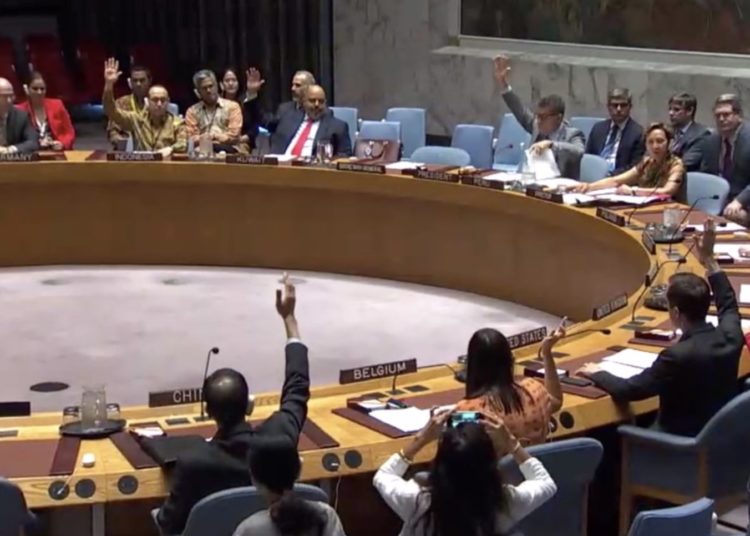Nordic Monitor
The United Nations Security Council (UNSC) did not seek the consent of the Turkish Cypriot government for an extension of the UN peacekeeping force in Cyprus (UNFICYP), in contrast to the UN’s established practices.
The resolution, numbered 2843, of the UNSC extending the mandate of the UNFICYP for a period of six months was unanimously adopted at its 8,586th meeting, on July 25, 2019. According to the resolution, the government of Cyprus agreed that “in view of the prevailing conditions on the island it is necessary to keep the UNFICYP beyond 31 July 2019.”
In parallel to the changing positions of its member states, the UNSC resolution itself and remarks put forward by representatives of member states indicate a significant shift in the UN’s Cyprus policy. During the meeting the current system of guarantees, the main component of Turkey’s Cyprus policy, was harshly criticized by a diplomat from the Russian Federation, Turkey’s close ally, Nordic Monitor has learned.
The EU, some of whose members were represented at the UNSC session, recently imposed sanctions on Turkey for its oil and gas exploration and drilling activities in the eastern Mediterranean.
The 15-member UN council further urged the leaders of both communities to resume negotiations to unify the island into a bi-zonal, bi-communal federation with political equality for a sustainable peace; stressed that the current status quo in Cyprus was unsustainable; and called for a reduction of tensions in the eastern Mediterranean and on all parties involved to refrain from any actions or rhetoric that might damage the chances for success.
Minutes of the UNSC meeting revealed that Dimitry Polyanskiy, the first deputy permanent representative of Russia to the UN, described the current system of external security guarantees as “largely anachronistic.” To the Russian diplomat, the participation of the three foreign states, including Turkey, does not help the Cypriots to arrive at an independent settlement for themselves and that the most effective way to ensure the independence, sovereignty and territorial integrity of a united Cyprus would be guarantees from the Security Council. The Russian proposal, if accepted by the UNSC, undermines Turkey’s key role in the solution process.
The Turkish Foreign Ministry in a press release reacted to the resolution and urged the UN to follow established rules and procedures. However, the official statement failed to touch on the Russian intervention proposing to change the current power structure set up in the 1960s in Cyprus. The foreign ministry alleged that the UNSC drafted the mandate “in a way to straitjacket all parties to discuss different alternatives for a negotiated settlement.”
Ten days before adoption of Resolution 2843, the EU states had agreed on political and financial sanctions against Turkey after it went ahead with drilling operations off Cyprus despite warnings from European leaders. On July 15, 2019 the EU Foreign Affairs Council decided to suspend negotiations on the Comprehensive Air Transport Agreement and to not engage in bilateral high-level dialogue, including the annual Association Council meeting. Moreover, it invited the European Investment Bank to review its lending activities in Turkey and endorsed the EU Commission’s now-implemented proposal to reduce pre-accession assistance to Turkey for 2020.
However, the Turkish Foreign Ministry in a subsequently issued statement promised to continue with the drilling, saying the actions are aimed at safeguarding the rights of Turkish Cypriots to the natural resources off the coast of the island. Ankara’s communiqué added: “The decisions taken by the EU council will in no way affect our country’s determination in continuing hydrocarbon activities in the East Mediterranean.” Turkey also vowed to send a fourth ship to join three other Turkish vessels in the region.
After independence in 1960, Cyprus, Greece, Turkey and the United Kingdom entered into a treaty to guarantee the basic provisions of the constitution and the territorial integrity and sovereignty of Cyprus. A series of constitutional crises resulted in the outbreak of inter-communal violence in December 1963. After all attempts to restore peace failed, the UNSC unanimously adopted Resolution 186 (1964), which recommended the establishment of the UNFICYP. Following reports every June and December of the UN secretary-general to the council about the status of the Cyprus conflict and the UN peacekeeping force, the council has consistently renewed the mandate.
Relations between the two sides in Cyprus came to a head in July 1974 when the military junta that was ruling Greece at the time staged a coup d’état so it could annex Cyprus as part of Greece. Turkey responded to the attempt and captured the northern part of the island by referring to the 1960 Treaty of Guarantee. Turkey recognizes northern Cyprus, which takes up around 36 percent of the island’s landmass, as the Turkish Republic of Northern Cyprus (KKTC). But the UN recognizes it as a territory of the Republic of Cyprus currently under Turkish occupation.












